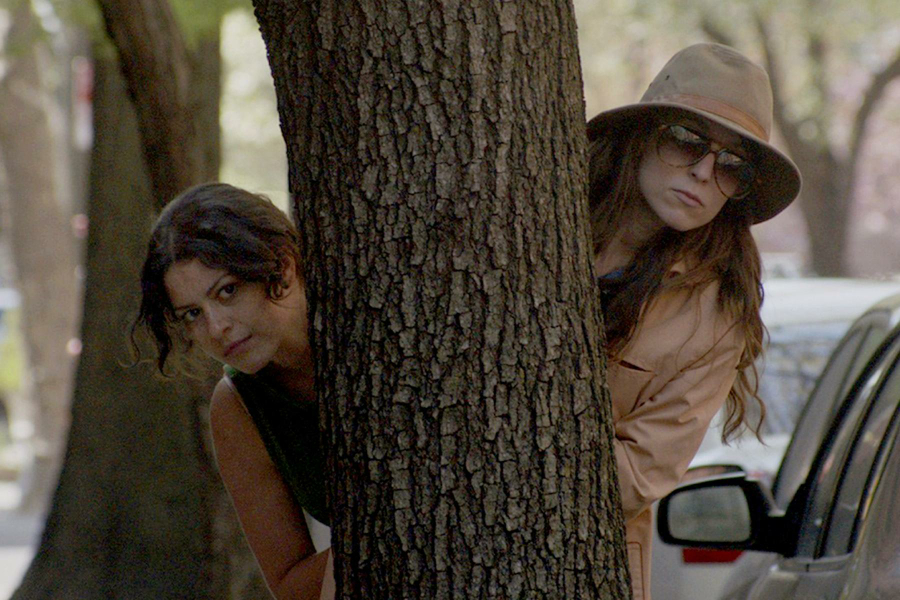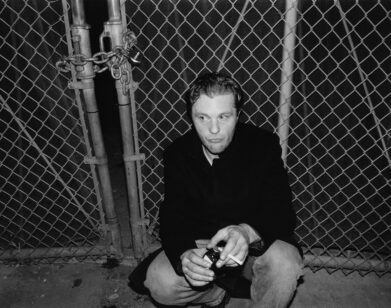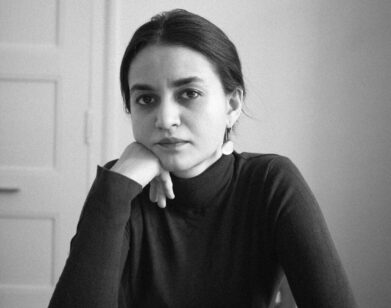SXSW’s Manhattan Murder Mystery

ABOVE: ALIA SHAWKAT (LEFT) AND SOPHIA TAKAL IN WILD CANARIES
There’s little about the previous two films of husband-and-wife filmmakers Lawrence Michael Levine and Sophia Takal that suggests a love for classic Hollywood movies or screwball comedies, so Wild Canaries, a comedic murder mystery written and directed by Levine, comes as somewhat of a surprise. Levine’s 2010 feature, Gabi on the Roof in July, and Takal’s 2011 feature-length directorial debut, Green, were self-financed microbudget dramas in which they cast themselves in key roles and relied on naturalistic writing and acting to explore the precarious relationships and emotional conflicts of their characters. Wild Canaries, which premiered at SXSW this week, carries over some of the same aesthetic approach but is built within the framework of old Hollywood genre pictures.
Levine and Takal play an engaged Brooklyn couple, Noah and Barri, who have disagreeing opinions about the sudden death of their elderly downstairs neighbor, Sylvia. The effusive Barri suspects foul play, whereas Noah, increasingly exasperated by Barri’s wild speculation, reasons that Sylvia had suffered from a heart condition. Against Noah’s warnings, Barri enlists their lesbian roommate, Jean (Alia Shawkat), to launch a clandestine investigation that involves spying on neighbors, breaking and entering, and other hijinks. As Barri digs deeper into the case, romantic entanglements begin to fluctuate.
The screenplay, which called for stunts and action sequences, required Wild Canaries to have a bigger budget than Levine and Takal’s previous films, so they sought investors for financing. They hired a casting director for the first time as well, a move that brought in seasoned comedic actors such as Shawkat. The film also stars Jason Ritter, Kevin Corrigan, and Annie Parisse.
Levine and Takal married in 2012, the culmination of a five-year engagement. Wild Canaries premiered on Saturday at SXSW, where Takal won the 2011 Emergent Narrative Woman Director award for Green.
CHRIS TINKHAM: How did the idea for Wild Canaries come about? Were you interested in trying a genre film?
LAWRENCE MICHAEL LEVINE: I was. I really like the conventional genres, and I’m interested in classic Hollywood films. Film noir, screwball comedy; those kinds of films are some of my favorite. So I did want to work in that vein and update it. I love comedy, and I’ve done a lot of improv; it’s always been a field of interest to me, and we never really explored it in our film work. We were working on darker projects like Green and the film that Sophia is going to direct this year, which is also bleak. So I just wanted to try something lighter and more comedic.
TINKHAM: This is the first time that you’ve played a couple in one of your own features. Have you done much of that before, when acting in other directors’ films?
SOPHIA TAKAL: No
LEVINE: We really haven’t.
TAKAL: Larry, remember? That was one of the first things we talked about when you were writing it, how you thought it would be fun for us to do that.
LEVINE: Yeah, that was the whole impetus for the movie. We were watching these old comic mysteries, the Thin Man series. They were these really popular movies in the ’30s, comedic murder mysteries about a couple that solves crimes. They drank a lot; they’re drunk the whole time. It’s Myrna Loy and William Powell, and they have great chemistry together, and it looks like they’re having a lot of fun. I don’t know if they were. And I don’t know if we did. I think we did half the time. That was the main thing; I wanted to do a comedy with Sophia. In life, she just cracks me up. She’s so wacky and filled with energy. I thought we’d make a good comedic team onscreen. I don’t know if I was right. [laughs]
TINKHAM: In this film, and in Gabi on the Roof in July, where you play siblings, you have some intense fighting scenes. Is that therapeutic, or is that detached from your personal lives?
TAKAL: Definitely not detached from our personal lives.
LEVINE: [laughs] But I wouldn’t call it therapeutic either.
TAKAL: You wouldn’t? I would. Obviously, there’s a lot of stress when you’re making a movie. Even with everyone that was there helping us, and supporting us, and working with us, we were very nervous, stressed out, or busy. I think the scenes where we’re fighting gave us an outlet for our frustrations with one another or with the situation or whatever was going wrong that day. The scene where I’m on the street toward the end, where I storm away from him, we were so angry at each other that whole day, and I feel like that really informed the performance of that scene.
LEVINE: I see what you mean when you speak about it from that perspective. But I remember the night where we shot the fight scene as being a very happy one for us.
TAKAL: That felt good. That was the first scene, so we hadn’t gotten mad at each other yet. [laughs]
LEVINE: I think we were happy and comfortable and felt like we were doing a good job, and that made us feel good.
TAKAL: Yeah, definitely.
TINKHAM: Where did the name of Sophia’s character, Barri, come from?
LEVINE: That’s a friend of mine from college, but I was drawn to the name because I liked the idea of gender confusion. Women now are becoming a bigger part of the work force, and men are becoming more obsolete to them in certain senses, with things like in vitro fertilization. Women are assuming a larger part of the economic life of the country, and there’s more openness about lesbian relationships. So, I had this idea for Noah as being symbolically and emotionally castrated throughout the film, and the mystery allows him to re-establish his masculinity in a sense. So I wanted a name and a woman that would challenge him and make him rise to the occasion. I think it’s great that women are assuming a larger role in public and economic life, and I think that men need to rise up and face the challenge. That’s sort of what the movie’s about. So that’s why I chose that name for her. It can be either gender, and I wanted to embrace this idea that men and women can have untraditional roles.
TINKHAM: How did you two meet?
TAKAL: Larry was my TA in my movie musical class at Columbia University. We didn’t talk during the semester, but at the end of the semester, the other TA of that class had a party where he invited all of the hot undergrads, and I was not invited, but my friends took me anyway, and that’s how Larry and I met.
LEVINE: Yes, that’s true.
TAKAL: We were friendly for maybe a year, and then we started dating, got engaged like a month after we started dating. We were engaged for five years and then got married.
LEVINE: I think it’s really fitting that we met in a movie musical class, because Sophia and I have very similar tastes in films. We both really like old films. We like musicals. We like old comedies. So, in a way, doing this movie together grew very organically out of our relationship.
TINKHAM: For each of you, what sparked your interest in acting and filmmaking?
TAKAL: I grew up being pretty obsessed with Judy Garland and her movies, so I think that’s where my desire to be an actor started. Growing up and applying to college, I just imagined that I would study acting. But then, once I went to college, I realized I was more interested in all the aspects of filmmaking as opposed to all the aspects of theater, which is what you would have to do if you studied acting at a liberal arts school. And so I thought, “Oh, I’ll meet directors and filmmakers, and I’m an actress, so I’ll become friends with them and hopefully be in their movies. And then meeting Lawrence—
LEVINE: —It worked!
TAKAL: Yeah. [laughs] No, I was just saying, watching you make movies is sort of when I became more interested in filmmaking rather than only acting.
LEVINE: I was obsessed with movies as a kid. I was really into Steven Spielberg movies. My earliest memories of childhood are waiting on these long lines with my dad, several times, to go back to the movies to watch E.T. and Raiders of the Lost Ark. I just loved movies when I was little, more than the average kid. I was pretty creative. I liked to draw and make up characters. And my parents were encouraging of it. My dad bought a camcorder really early, and the second he brought the camera home, I started playing around with it and making movies, and my parents liked them. So I just kept going, and I never really stopped.
TINKHAM: Sophia, I wanted to follow up on something you said in late 2011, that you and Larry were writing a script together and that you were going to be shooting it in Los Angeles. Did anything become of that?
TAKAL: Yeah, I’m hoping to shoot it in September at Big Sur. It’s called Always Shine. We finished a draft. We’re casting it now and putting everything together, so hopefully it’ll happen in September. And Larry really wrote the script, based on conversations we had. He ended up writing a really incredible script that I’m excited to make.
LEVINE: But it was her story.
TINKHAM: At the time, you were talking about directing together. Is that still the plan?
TAKAL: I don’t think so. Maybe one day. It feels, based on our personalities, that someone needs to be the director in order to have the final say. Otherwise, we could go around in circles forever.
LEVINE: We both have strong personalities, and we don’t always agree on certain specific choices. And we both really have our own aesthetics. So, I don’t think it makes sense for us—at this point, at least—to direct things together. That’s not a plan for the immediate future.
WILD CANARIES IS CURRENTLY COMPETING IN THE NARRATIVE FEATURE COMPETITION AT SXSW IN AUSTIN, TEXAS.






